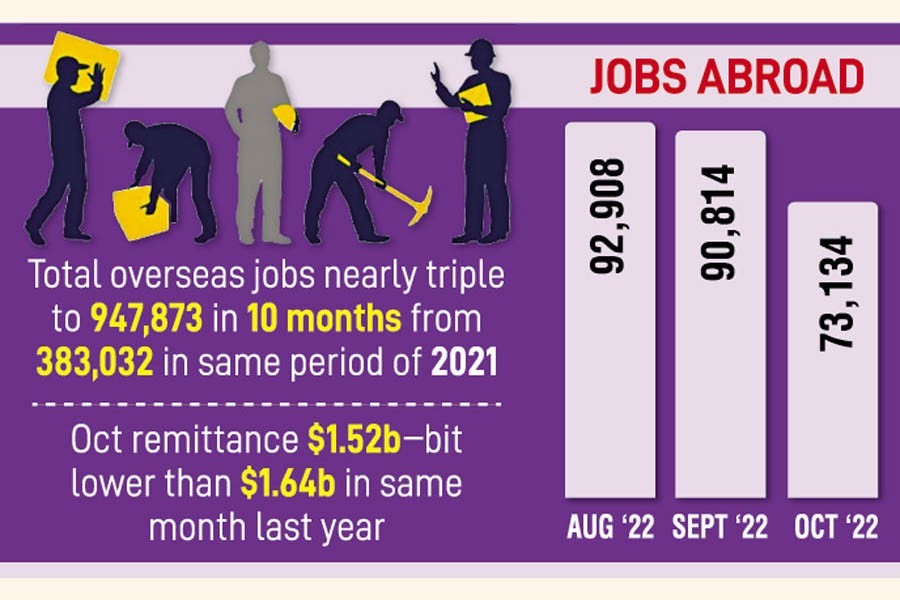Bangladesh saw the outflow of workers ebb to a three-month low in October as manpower recruitment slowed in recent months in key Middle-East job markets, at a crucial time, sources say.
Remittance inflow also showed a downturn in the month, thus adding to strain on the country's foreign-exchange reserves. Foreign currencies sent home by expatriate workers are the second-largest source of forex earnings by the country-the first one being export trade. Bureau of Manpower Employment and Training (BMET) data show a slide--Bangladesh sent 73,134 workers in October this year, while 90,814 in September and 92,908 workers in August.
Manpower recruiters said recruitment from the key job-destination-country Saudi Arabia showed a downturn in recent months.
The available BMET statistics show that Saudi Arabia hired 39,968 workers in July, 47,033 in August and 41,057 in September and 30,121 in October. The gulf nation recruited 71,920 workers in June, and the highest recruitment was 78,870 in March of this year.
Shameem Ahmed Chowdhury Noman, secretary-general of Bangladesh Association of International Recruiting Agencies (BAIRA), cites a factor for the slowdown. He says recruiters could not submit passports to the Saudi Embassy as before for various reasons.
"As a result, there has been a slight slowdown in the sending of workers recently. However, from this week recruiters can submit passports normally. Therefore, it is expected that the outflow of workers to that Arab nation would pick up again," he told the FE.
The intake also decreased in Oman to 9400 workers in the last month from 17967 in the previous month.
Recruitment by the United Arab Emirates (UAE) also declined in recent months.
Rediscovered manpower-market Malaysia, on the other hand, helps save the situation. Kuala Lumpur hired more workers in October than in September. The Southeast Asian nation hired 9,649 workers in October, up from 4,659 taken in September.
The intake also increased in some ME markets, too, including Kuwait, Oman and Qatar.
However, the total overseas employments nearly triple to 947,873 in the 10 months of this calendar year from 383,032 in the same period in 2021.
And officials at the BMET hope a record number of workers would go abroad in the outgoing calendar year.
Md Shahidul Alam, director-general of BMET, says they have taken different initiatives after Covid-19 to increase the outflow of workers. The services relating to manpower-sending process have been improved by the BMET.
"We have also signed deal with new job markets like Greece," he mentioned.
So, hopefully, the number of overseas employments would continue to have a steady growth in coming days.
The BMET chief also said they were emphasising skilled manpower migration to enhance remittance earnings. Migration experts point out that unskilled masses are sent abroad with the result of lower wage earnings compared to other countries.
There have been reports of remittance inflow through informal channels, like hundi. As a result, the country's forex reserves fail to replete with remittances commensurate with the number of expatriates-put at some 15 million.
The DG requests the authorities to make proper policy to increase remittance in official channel.
"We are trying our best to enhance quantity and quality of labour migration, and we also wish to see a healthy growth in remittance home," he says.
Bangladeshis working abroad remitted US$ 1.52 billion in October-a bit lower than in the same month last year. The expatriates sent home $1.64 billion in October in 2021, Bangladesh Bank (BB) data show.
Migrant rights activists say many workers in Saudi Arabia and the UAE are not getting due jobs. So they are facing terrible trouble in those countries. They urge the government to ensure job first before sending workers to those countries.


